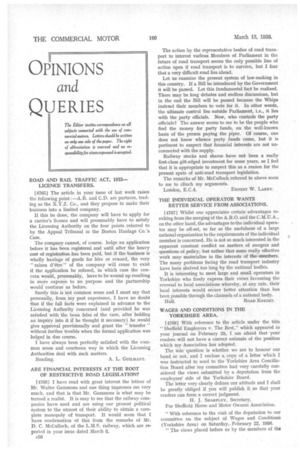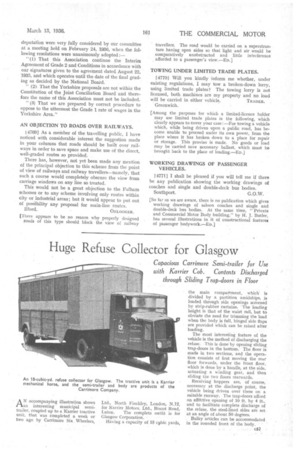OPINIONS
Page 108

Page 109

If you've noticed an error in this article please click here to report it so we can fix it.
and
QUERIES
The Editor invites correspondence on all subjects connected with the use of commercial motors. Letters should be written on only one side of the paper. The right of abbreviation is reserved and no responsibility for views expressed is accepted.
ROAD AND RAIL TRAFFIC ACT, 1933— LICENCE TRANSFERS.
[47651 The article in your issue of last week raises the following point :—A.B. and C.D. are partners, trading as the X.Y.Z. Co., and they propose to make their business into a limited company.
If this be done, the company will have to apply for a carrier's licence and will presumably have to satisfy the Licensing Authority on the four points referred to by the Appeal Tribunal in the Boston Haulage Co.'s Case.
The company cannot, of course, lodge an application before it has been registered and until after the heavy cost of registration has been paid, but if the business is wholly haulage of goods for hire or reward, the very "raison d'6tre " of the company will cease to exist if the application be refused, in which case the concern would, presumably, have to be wound up resulting in more expense to no purpose and the partnership would continue as before.
Surely this is not common sense and I must say that personally, from my past experience, I have no doubt that if the full facts were explained in advance to the Licensing Authority concerned (and provided he was satisfied with the bona fides of the case, after holding an inquiry into it if he thought it necessary) he would give approval provisionally and grant the " transfer" without further trouble when the formal application was lodged in due course.
I have always been perfectly satisfied with the common sense and courteous way in which the Licensing Authorities deal with such matters.
Reading. A. L. GUILVIANT.
ARE FINANCIAL INTERESTS AT THE ROOT OF RESTRICTIVE ROAD LEGISLATION?
[4766] I have read with great interest the letters of Mr. Walter Gammons and one thing impresses me very much, and that is that Mr. Gammons is what may be termed a realist. It is easy to see that the railway companies have, used and are using our present political system to the utmost of their ability to obtain a complete monopoly of transport. It would seem that I have confirmation of this from the remarks of Mr. D. C. McCulloch, of the L.M.S. railway, which are reported in your issue dated March 6.
The action by the representative bodies of road transport to interest various Members of Parliament in the future of road transport seems the only possible line of action open if road transport is to survive, but I fear that a very difficult road lies ahead.
Let us examine the present system of law-making in this country. If a Bill be introduced by the Government it will be passed. Let this fundamental fact be realized. There may be long debates and endless discussions, but in the end the -Bill will be passed because the Whips instruct their members to vote for it. In other words, the ultimate control lies outside Parliament, i.e., it lies with the party officials. Now, who controls the party officials? The answer seems to me to be the people who find the money for party funds, on the well-known basis of the person paying the piper. Of course, one does not know whence party funds come, but it is pertinent to suspect that financial interests are not unconnected with the supply.
Railway stocks and shares have not been a really first-class gilt-edged investment for some years, so I feel that it is appropriate to suspect this as a reason for the present spate of anti-road transport legislation.
The remarks of Mr. McCulloch referred to above seem to me to clinch my arguments.
London, E.C.4. ERNEST W. LARBY.
THE INDIVIDUAL OPERATOR WANTS BETTER SERVICE FROM ASSOCIATIONS.
[4767] Whilst one appreciates certain advantages resulting from the merging of the A.R.O. and the C.M.U.A., on the other hand,the advantages to the individual operator may be off-set, so far as the usefulness of a large national organization to the requirements of the individual member is concerned. He is not so much interested in the apparent constant conflict on matters of mergers and questions of policy, but rather that some really effective work may materialize in the interests of the menthe's. The many problems facing the road transport industry have been shelved too long by the national bodies.
It is interesting to meet large and small operators in Yorkshire who freely express their views favouring the reversal to local associations whereby, at any rate, their local interests would secure better attention than has been possible through the channels of a national body.
Hull. ROAD KNIGHT.
WAGES AND CONDITIONS IN THE YORKSHIRE AREA.
[4768] With reference to the article under the title "Sheffield Employers v. The Rest," which appeared in your journal on February 28, I am afraid that your readers will not have a correct estimate of the position which my Association has adopted.
The sole question is whether we are to honour our bond or not, and I enclose a copy of a letter which I was instructed to send to the Yorkshire Area Conciliation Board after my committee had very carefully considered the views submitted by a deputation from the employers' side of the Yorkshire Board.
The letter very clearly defines our attitude and I shall be greatly obliged if you will publish it so that your readers can form a correct judgment.
H. 3. SHARPLEY, Secretary,
For Sheffield Horse and Motor Owners Assotfation.
"With reference to the visit of the deputation to our committee on the subject of Wages and Conditions (Yorkshire Area) on Saturday,. February 22, 1936.
" The views placed before us by the members of the deputation were very fully considered by our committee at a meeting held on February 24, 1936, when the following resolutions were unanimously adopted :— "(1) That this Association continue the Interim Agreement of Grade 2 and Conditions in accordance with our signatures given to the agreement dated August 22, 1935, and which operates until the date of the final grading as decided by the National Board.
" (2) That the Yorkshire proposals are not within the Constitution of the Joint Conciliation Board and therefore the name of this Association must not be included.
"(3) That we are prepared by correct procedure to oppose to the uttermost the Grade 1 rate of wages in the Yorkshire Area."
AN OBJECTION TO ROADS OVER RAILWAYS.
147691 As a member of the travelling public, I have noticed with considerable interest the suggestion made in your columns that roads should be built over railways in order to save space and make use of the direct, well-graded routes so provided.
There has, however, not yet been made any mention of the principal objection to this scheme from the point of view of railways and railway travellers—namely, that such a course would completely obscure the view from carriage windows on any line so treated.
This would not be a great objection to the Fulham schemes or to any scheme involving only routes within city or industrial areas ; but it would appear to put out of posiibility any proposal for main-line routes.
Ii ford. ONLOOKER.
[There appears to be no reason why properly designed roads of this type should block the view of railway travellers. The road would be carried on a superstructure having open sides so that light and air would be comparatively unobstructed and little interference afforded to a passenger's view.—En.1 TOWING UNDER LIMITED TRADE PLATES.
[4770] Will you kindly inform me whether, under existing regulations, I may tow a broken-down lorry, using limited trade plates? The towing lorry is not licensed, both machines are my property and no load will be carried in either vehicle. TRADER. Greenwich.
[Among the purposes for which a limited-licence holder may use limited trade plates is the following, which clearly appears to cover your case : —For towing a vehicle which, while being driven upon a public road, has become unable to proceed under its own power, from the place where it has broken down to a place for repair or storage. This proviso is made. No goods or load may be carried save necessary ballast, which must be brought back to the place of loading.—En.]
WORKING DRAWINGS OF PASSENGER VEHICLES.
[4771] I shall be pleased if you will tell me if there be any publication showing the working drawings of coaches and single and double-deck bus bodies.
Southport. G.O.W.
[So far as we are aware, there is no publication which gives working drawings of saloon coaches and single and double-deck bus bodies. At the same time, " Private and Commercial Motor Body building," by H. 3. Butler, has several illustrations in it of constructional features of passenger bodywork.—En.]


























































































































































